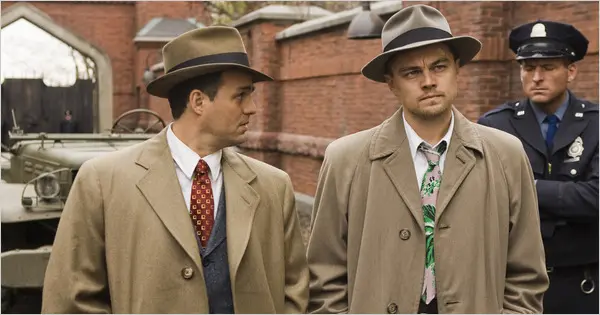Thursday, April 3
Sanity and Insanity in a Classic Thriller
Joelle Vermut ’25 in Arts | April 28, 2023

Shutter Island is an amazingly crafted psychological thriller film that explores the dark corners of the human mind. Directed by Martin Scorsese and based on the novel by Dennis Lehane, Shutter Island has remained a must-watch movie since its release in 2010. The film tells the story of two U.S. Marshalls, Teddy Daniels, played by Leonardo DiCaprio, and Chuck Aule, played by Mark Ruffalo, who are sent to investigate the disappearance of a patient from a maximum-security hospital for the criminally insane on the remote Shutter Island. The island is surrounded by a thick fog, creating a sense of isolation and danger. As the investigation unfolds, it becomes clear that all is not as it seems. As they delve deeper into the case, they encounter resistance from the hospital staff, who seem intent on keeping them in the dark as to what is going on and psychologically disturbed inmates.
Teddy, haunted by his past experiences as a soldier in World War II, begins to experience vivid hallucinations and is taunted by dreams of his dead wife. As the film progresses, Teddy becomes increasingly convinced that the asylum is involved in a sinister plot, and he must confront his own demons in order to uncover the truth.
One of the most striking aspects of Shutter Island is its pacing. The story unfolds slowly, with the characters incrementally uncovering the truth behind the disappearance of the patient. This deliberate pacing gradually builds the tension, creating a sense of dread and anticipation. The use of flashbacks and dream sequences is also effective in adding depth and complexity to the narrative. Moreover, the film highlights the complexity of the human psyche and the thin line between sanity and insanity. As Teddy and Chuck slowly uncover pieces that help them solve the mystery, the audience is able to connect the dots that Teddy doesn’t see. The movie raises questions about the ways in which we construct our own realities, and how our past experiences can shape our perceptions of the world around us.
Leonardo DiCaprio delivers a powerful performance as Teddy Daniels. He brings raw intensity and emotional depth to the character, which is both captivating and haunting. Through his portrayal of Teddy's descent into madness, he explores themes of trauma, grief, and the limits of sanity in a way that is extremely thought-provoking. DiCaprio's performance is a standout in his already impressive career.
The film's setting also plays a significant role in creating a sense of unease. The imposing Gothic architecture of the asylum looms over the marshals as they set foot on the island, surrounded by mist and rough waters. The production design and cinematography are outstanding as well, creating a haunting and unsettling atmosphere that keeps the audience thinking long after the film has ended.
In conclusion, the twist ending of Shutter Island is both surprising and satisfying, bringing the various strands of the story together. The film's final moments leave the audience questioning their own perceptions of reality and the limits of the human mind, making Shutter Island a must-watch for anyone searching for an unpredictable psychological thriller. Shutter Island is an amazing work of suspense that explores the mysteries of the mind. The film will leave you questioning your own perceptions of reality and the limits of the human mind. The usage of deliberate pacing, flashbacks, dream sequences, and outstanding performances make Shutter Island a must-watch movie for anyone searching for a thought-provoking thriller.
Related Articles
- You Have Bewitched Me, Movie and Book: The Evolution of Pride and Prejudice Celestine Sutter ’27
- Second Form Shakespeare Preview: Julius Caesar Presented by the Class of 2028 Esha Desai ’28
- The Arts Celebrated during Lawrenceville’s Black History Month Melina Kyriakopoulos ’27
- Trump Installs Himself as Chairman of the Kennedy Center Jane Shindnes ’26
- How has “Being Woke’’ Become so Controversial? Mara McKithen ’28
Recent Articles
- Trump Installs Himself as Chairman of the Kennedy Center Jane Shindnes ’26
- You Have Bewitched Me, Movie and Book: The Evolution of Pride and Prejudice Celestine Sutter ’27
- Second Form Shakespeare Preview: Julius Caesar Presented by the Class of 2028 Esha Desai ’28
- The Arts Celebrated during Lawrenceville’s Black History Month Melina Kyriakopoulos ’27
- How has “Being Woke’’ Become so Controversial? Mara McKithen ’28